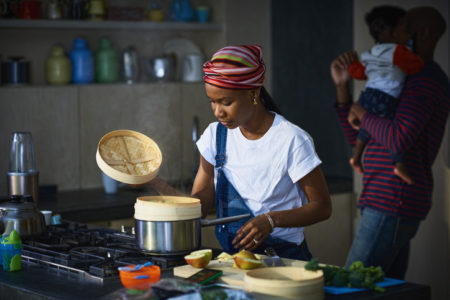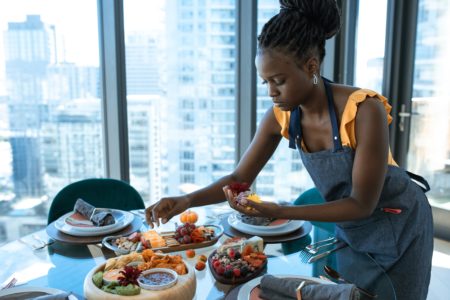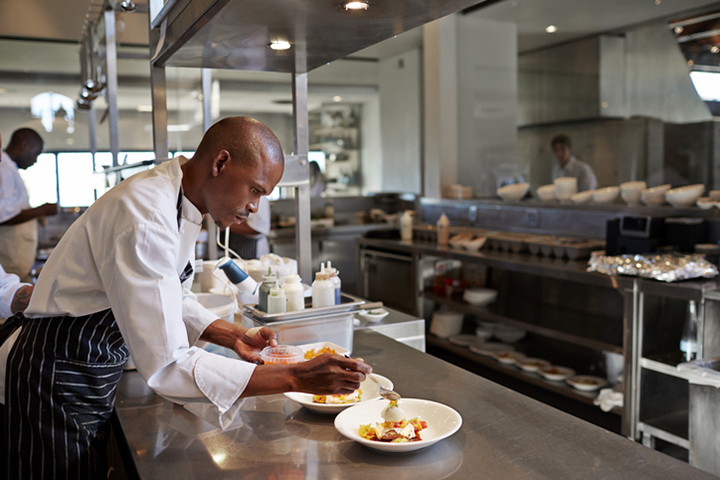A recent story by TravelNoire revealed that on the list of the world’s 50 best restaurants, none on the list are Black-owned.
In a press release announcement, it was revealed that the competition — which was sponsored by S. Pellegrino and Acqua Panna — had unveiled its list of the world’s best of the best. And, as perhaps can be expected, the winners of the competition were almost exclusively based in Europe and North America.
Additionally, the vast majority of the restaurants were run by men, and the one and only African restaurant in the top 50 — South Africa’s Wolfgat — came in at the very bottom of the list.
This list of the best restaurants seems to fly in the face of conventional wisdom in the hospitality industry. According to data supplied by Restaurant Hospitality, a publication that caters to the restaurant industry, more than one-third of consumers are specifically seeking out Black-owned restaurants. The outlet spoke to an executive at Coca-Cola, who made it clear that the rise of social justice initiatives and the COVID-19 pandemic highlighted the need for such disparities in the restaurant industry to be addressed.
“Our study found that recent events around race and social justice have inspired diners to seek out Black-owned restaurants,” said Kathleen Ciaramello, President of Foodservice and On-Premise at The Coca-Cola Company. “This increased support comes at a time when Black restaurant owners desperately need it, as 84% of them have made staff reductions due to COVID-19.”
In response to our story, a representative from 50 Best Restaurants agreed to sit down with us to address some of the disparities — and what they’re doing to bridge the gap. The answers may surprise you, in a good way.
Whom are you working with, on the restaurant side, to bring more diverse cuisines and faces to the forefront in the restaurant industry?

- The World’s 50 Best Restaurants Academy is comprised of more than 1,000 voters, each selected for their expert opinion of the international restaurant scene, with a 50/50 gender balance. To create the Academy, and give it a fair representation of the global restaurant scene, we divide the world up into 26 geographical regions. Each region has a chairperson appointed for their knowledge of their part of the restaurant world. These chairs each select a voting panel of 40 people – ensuring a balanced selection of chefs, restaurateurs, food/restaurant journalists and well-travelled gourmets.
- In 2022, The World’s 50 Best Restaurants proposes to double the number of Africa-based voters within The World’s 50 Best Restaurants Academy to better reflect the developing food and restaurant sector across the African continent.
- In May 2021, 50 Best announced that Jamila Robinson, Food Editor of the Philadelphia Inquirer, and keynote contributor to the 50 Best Recovery Summit in October 2020, would be taking on the role of Academy Chair for USA & Canada (East). As part of her new role, Jamila attended her first Academy Chair meeting at The World’s 50 Best Restaurants 2021 in Antwerp where we discussed the next steps on voting, and the future of the awards amongst other important topics.
- Also in Antwerp at The World’s 50 Best Restaurants 2021, we held #50BestTalks: Aftershock the latest edition of 50 Best’s thought-leadership forum, with Selassie Atadika as one of our on-stage panellists alongside Junghyun Park and Daniel Humm. After spending a decade working on humanitarian projects with the UN and teaching herself how to cook, Atadika enrolled at the Culinary Institute of America and has since conceived her own brand of new African cuisine. Midunu – which translates as ‘let us eat’ – is her project to challenge diners’ perceptions of West African food. Despite having a physical home and events space in the residential Tesano neighbourhood of Accra in Ghana, the restaurant’s culinary concept is all about nomadic eating: Atadika curates multi-course experiences across the city that focus on delivering her country’s bounty to the table by integrating underutilised grains and protein.
- Champions of Change – Champions of Change is a new awards initiative launched in 2021 as part of The World’s 50 Best Restaurants overall programme. It highlights a small number of unsung heroes who have used the extraordinary events of 2020 as a springboard for positive action. It provides a substantial monetary donation to each of the recipients’ causes and supports long-term progress in the restaurant and food sphere, whether through helping others, developing inspirational blueprints or creating a healthier planet.
- 2021 Champions of Change winners are Kurt Evans, Viviana Varese and Deepanker Khosla which were announced in July 2021
- Philadelphia-based Black American chef Kurt Evans is fighting for reform in the US, using food as his medium. When the pandemic first hit the US, Evans was working as culinary director at New York-based non-profit Drive Change. The programme, which helped train formerly incarcerated youth in the culinary arts, abruptly ended and the chef and activist moved back to Philadelphia, where he co-founded Down North Pizza with Muhammad Abdul-Hadi. The ‘mission-led for-profit restaurant’ in the city’s Strawberry Mansion neighbourhood exclusively employs formerly incarcerated individuals while providing culinary career opportunities with a fair wage. Through the ground-breaking End Mass Incarceration dining series, the creation of a new restaurant business model and his community-focused activism, Kurt is driving change across the culinary landscape and beyond.
- Viviana Varese, the chef of Michelin-starred restaurant Viva in Milan faced considerable obstacles entering the world of haute cuisine as a young cook. Despite being discriminated against in the restaurant sector for being a woman, a lesbian and from the south of Italy, Varese persevered, taught herself how to cook and found success with her restaurant Alice in Milan, opened in 2007. Since then, she transformed Alice into a fresh concept, Viva, and opened a new venue in Sicily in 2021, W Villadorata Country Restaurant, while campaigning for a more inclusive hospitality world.
- Hailing from Allahabad in India, Deepanker Khosla turned his Bangkok-based restaurant Haoma into a soup kitchen for out-of-work Bangkok residents when the pandemic reached Thailand. He raised funds for his campaign, which he named #NoOneHungry, through crowdfunding and kept his staff employed by cooking, prepping and distributing meals across the city’s most impoverished areas, serving over 100,000 free meals to date.
- Each Champion of Change winner has received £20,000 each for their projects (totalling £60,000 for all 3 winners)
- As part of The World’s 50 Best Restaurants 2021 programme in Antwerp, Flanders, we held an interactive live event called Food Meets Talent. Participants included a diverse group of individuals from all backgrounds and places including Adelaide Lala Tam. 27-year-old Lala Tam is one of the most exciting artists of her generation. After critical success for her art in her native Hong Kong, she moved to the Netherlands to study and set up a studio with a vision to make a splash on the global food scene. Through the use of mixed-media installations, she dismantles industrial food production by encouraging consumers to examine their own relationship with the things that they eat and their own responsibilities in the process.
- Kurt Evans – the aforementioned Champions of Change winner was also due to be in Antwerp in-person presenting his work and latest projects, however, was unable to join last minute due to a family illness. A video was shown in his absence explaining how he created his new restaurant model, Project M.O.R.E, and how he believes it can improve the restaurant ecosystem in the US
- The 2021 American Express One To Watch Award recipient is a restaurant that is Black-co-owned – Ikoyi, in London, UK — led by Chef Jeremy Chan and Restaurant Director Iré Hassan-Odukale. The award resulted in global media coverage in top tier publications across the world from The Telegraph to CNN Espanol to Wallpaper*. Jeremy and Iré were also present in Antwerp where we held an exclusive event called ‘Meet the Chefs’ whereby 30 of the top international media in attendance for the awards got a chance to sit down with the pair and interview them for more robust feature coverage highlighting their work and increasing education and consumer attention to West African cuisine and restaurants. In addition to the exposure, winning awards through 50 Best results in increased demand for bookings, and thus increases revenue for the restaurants that are recognized.
- 50 Next– 50 Next is a list of people who are shaping the future of gastronomy. Formed through robust research and analysis by 50 Best and the internationally renowned Basque Culinary Center, it showcases a diverse global selection of bright young minds who have turned their ideas into reality. A list but not a ranking, 50 Next aims to inspire, empower and connect young people who are pushing boundaries at every level of the food chain. The first edition was revealed in 2021 and the second will be published in February 2022.
- Please see the list of 50 Nexters from 2021 here which includes Jon Gray (Entrepreneurial Creatives); Ashtin Berry (Hospitality Pioneers); Dieuveil Malonga, Edward Mukiibi, Maureen Muketha (Empowering Educators) amongst others from all over the globe doing incredible work
Those listed above represent just some of the initiatives that the 50 Best organization is utilizing in order to highlight and celebrate and diverse range of cuisines and individuals across its platforms, ranging from awards to social media channels to live events.
At what point do you feel things will be fairer and more equitable across all races and backgrounds in your industry?

- All genders, races, and backgrounds have not had equal support in the restaurant industry for decades, meaning today there are fewer female-run kitchens and fewer kitchens run by ethnic minorities.
- Having an equal number of men and women in the Academy and dividing the world more equitably is a step in the right direction to a more diverse list, but it’s not going to change the composition of the restaurant industry overnight, and it’s likely to take some time before we see marked changes in the composition of The World’s 50 Best Restaurants list
- By giving a diverse group of people an equal voice in the Academy and the voting panels, we’re starting to make more meaningful change and hoping to get more women and ethnic minority groups in positions of power and influence.
- 50 Best is dedicated to creating a platform that encourages and rewards through, among other things: Champions of Change; 50 Next; Special awards (which celebrate restaurants/restaurant teams and also chefs/individuals; 50 Best Discovery; Academy voter changes (25% is changed each year) to keep the panel is fresh and relevant; Academy Chair meetings to instigate discussions and actionable changes.
Why has African and African-inspired cuisine been otherwise ignored by such lists as yours for so long?

- African cuisine has long been ignored on the global stage, which can only be due to ingrained Western bias.
- As mentioned above, we can’t expect rapid change overnight, but African-inspired cuisine has definitely started gaining a greater presence on the global scale, albeit more slowly than we would like.
- Ikoyi winning the American Express One To Watch award represents one such example.
- South African restaurant Wolfgat also features in the prestigious 1-50 list this year for the first time.
- 50 Best also announced the launch of the Middle East & North Africa’s 50 Best Restaurants, the inaugural edition of which will take place in February 2022. 50 Best recognizes the MENA region is long overdue global recognition, including the region’s chefs and restaurants. The range of ingredients, spices, traditions, techniques, influences, and talent across this vast expanse of land is there to be explored, whether from within the region itself or from further afield, as travel begins to open up again come 2022. We are confident that MENA’s 50 Best will inspire people to travel from within the region and internationally to visit in order to explore the culinary gems put in the spotlight by the awards and its surrounding events program. A series of special awards, as we do in the World edition of the awards, will also be unveiled as part of the Middle East & North Africa’s 50 Best Restaurants, which we are confident will bring more diverse cuisines and faces to the forefront of the industry.
Is there anything you can tell us about more proactive efforts that you're taking to ensure more diversity on your lists in the future? (I know you mentioned you were doing so, but our readers are about action - so we'd like to know about the actions you're taking.)

- As part of the 50 Best for Recovery campaign in 2020, the 50 Best organization and our partners joined forces to raise $1.29m in total. Donations were made in the following amounts to the following organizations:
- $40,000 donation to Lee Initiative’s Restaurant Reboot Relief Program(USA) $40,000 donation to Black Urban Growers (US)
- $40,000 donation to Nosso Prato(Brazil)
- $40,000 donation to the Eat Out Restaurant Relief Fund(South Africa)
- $40,000 donation to the National Restaurant Association of India’s Feed the Needy campaign (India)
- $6,000 donation to Horeca Next(Belgium)
- $25,000 donation to Ambasciatori del Gusto(Italy)
- $5,000 donation to the Singapore Cocktail Bar Association(Singapore)
- $40,000 donation to Chefs for Spain, the Spanish arm of World Central Kitchen (Spain)
This information is available on our website here
- 50 Best Discovery
- 50 Best Discovery, our in-depth collection of city guides, has also recently undergone a major refresh, with nearly 600 new venues added in August 2021. There are now over 2,000 venues on the platform and 81 global countries included.
- Champions of Change winners, 50 Nexters, and all participants in our 50 Best event programming and awards all receive international exposure via our platforms – on social media, articles on our website, press releases that are distributed to global media, and through our own marketing channels which reach key chefs, VIPs, influencers and tastemakers in the hospitality industry, bringing them to the forefront and highlighting each of them for their own unique accomplishments. When we say 50 Best is more than just a list, it is truly the case as we run an entire content operation as well, using our multiple platforms to shine a spotlight on establishments and individuals which have had a positive business and economic impact on those establishments and individuals as well as creating awareness and buzz.
- 50 Best’s goals have long been, and continue to be, focused on: inspiring diners to travel and explore restaurants and bars, unveiling up-and-coming chefs and culinary trends, and showcasing the subtlety and complexity of various cuisines and cultures from around the world – with many more still to discover and celebrate. We know there is a long way to go to create a more equitable food future, but it is our sincere and genuine aim to bring together communities across the hospitality sector to foster collaboration, inclusivity, diversity, and discovery and help drive positive change.
